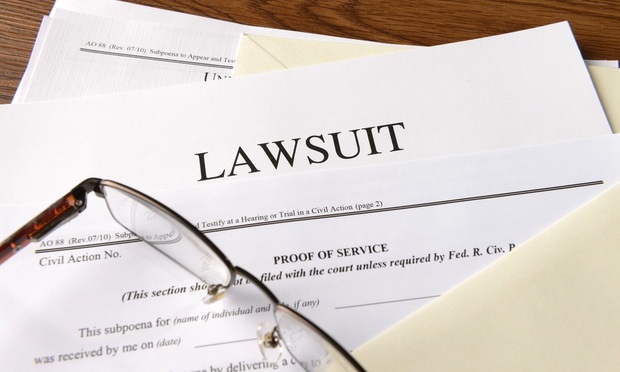Registering to Do Business in Pa. Means You Can Be Sued in Pa., Court Rules
A company registering to do business in Pennsylvania, even as a foreign corporation, can be sued in the state's courts, the Pennsylvania Superior Court has ruled in a case of first impression.
September 26, 2018 at 03:42 PM
3 minute read
 Photo: Shutterstock
Photo: Shutterstock
A company registering to do business in Pennsylvania, even as a foreign corporation, can be sued in the state's courts, the Pennsylvania Superior Court has ruled in a case of first impression.
The ruling came in the case of several New York firefighters who sued Federal Signal Corp. over hearing loss from excessive sound exposure from fire engine sirens. The lawsuit was filed in Pennsylvania, where Federal Signal is registered as a foreign corporation.
Initially, a Philadelphia judge dismissed the case for lack of jurisdiction, but the Superior Court reversed that ruling. The appellate court noted that the issue of business registration was not addressed by the U.S. Supreme Court in Daimler AG v. Bauman, a case in which the justices ruled that jurisdiction could not be exercised over a corporation in a state where that corporation was not “at home.”
“We observe that whether a foreign corporation consents to general personal jurisdiction in Pennsylvania by registering to do business in the commonwealth is a matter of first impression in this court,” Superior Court Senior Judge William Platt wrote in the court's majority opinion. “Our review of the caselaw has revealed that neither this court nor our Supreme Court has had the occasion to determine whether, post-Daimler, registering to do business as a foreign corporation in the commonwealth constitutes consent for the purposes of exercising general personal jurisdiction.”
The court turned to Bors v. Johnson & Johnson, a case from the U.S. District Court for the Eastern District of Pennsylvania, for guidance.
“In Bors, supra, the district court considered whether Bane v. Netlink Inc. remained good law or whether Daimler eliminated consent by registration under Section 5301 as a basis for jurisdiction,” Platt said. “The Bors court reasoned that 'Pennsylvania's statute specifically advises the registrant of the jurisdictional effect of registering to do business[,]' and concluded that '[c]onsent remains a valid form of establishing personal jurisdiction under the Pennsylvania registration statute after Daimler.'”
Judge Anne Lazarus joined Platt's opinion, but Judge Mary Jane Bowes wrote a dissent, arguing that the case “does not involve Pennsylvania in any meaningful way.”
“Appellants, who comprise several plaintiffs from Massachusetts, New York, and Florida, sued Federal Signal Corporation ('appellee'), a Delaware company with its principal place of business in Illinois, for injuries that allegedly occurred in New York. Appellants' pleading failed to establish the grounds for Pennsylvania to exercise personal jurisdiction over the out-of-state appellee. Therefore, I believe that the trial court properly sustained appellee's preliminary objection to the complaint and dismissed the claims against it for lack of personal jurisdiction,” Bowes said.
Wayne Graver of Lavin, O'Neil, Cedrone & DiSipio, who represents Federal, did not return a call seeking comment. Thomas Joyce of Marc H. Bern & Partners represents the plaintiffs and also did not return a call seeking comment.
This content has been archived. It is available through our partners, LexisNexis® and Bloomberg Law.
To view this content, please continue to their sites.
Not a Lexis Subscriber?
Subscribe Now
Not a Bloomberg Law Subscriber?
Subscribe Now
NOT FOR REPRINT
© 2025 ALM Global, LLC, All Rights Reserved. Request academic re-use from www.copyright.com. All other uses, submit a request to [email protected]. For more information visit Asset & Logo Licensing.
You Might Like
View All


Feasting, Pledging, and Wagering, Philly Attorneys Prepare for Super Bowl
3 minute read
TikTok Opts Not to Take Section 230 Immunity Fight to U.S. Supreme Court
4 minute readTrending Stories
- 1States Accuse Trump of Thwarting Court's Funding Restoration Order
- 2Microsoft Becomes Latest Tech Company to Face Claims of Stealing Marketing Commissions From Influencers
- 3Coral Gables Attorney Busted for Stalking Lawyer
- 4Trump's DOJ Delays Releasing Jan. 6 FBI Agents List Under Consent Order
- 5Securities Report Says That 2024 Settlements Passed a Total of $5.2B
Who Got The Work
J. Brugh Lower of Gibbons has entered an appearance for industrial equipment supplier Devco Corporation in a pending trademark infringement lawsuit. The suit, accusing the defendant of selling knock-off Graco products, was filed Dec. 18 in New Jersey District Court by Rivkin Radler on behalf of Graco Inc. and Graco Minnesota. The case, assigned to U.S. District Judge Zahid N. Quraishi, is 3:24-cv-11294, Graco Inc. et al v. Devco Corporation.
Who Got The Work
Rebecca Maller-Stein and Kent A. Yalowitz of Arnold & Porter Kaye Scholer have entered their appearances for Hanaco Venture Capital and its executives, Lior Prosor and David Frankel, in a pending securities lawsuit. The action, filed on Dec. 24 in New York Southern District Court by Zell, Aron & Co. on behalf of Goldeneye Advisors, accuses the defendants of negligently and fraudulently managing the plaintiff's $1 million investment. The case, assigned to U.S. District Judge Vernon S. Broderick, is 1:24-cv-09918, Goldeneye Advisors, LLC v. Hanaco Venture Capital, Ltd. et al.
Who Got The Work
Attorneys from A&O Shearman has stepped in as defense counsel for Toronto-Dominion Bank and other defendants in a pending securities class action. The suit, filed Dec. 11 in New York Southern District Court by Bleichmar Fonti & Auld, accuses the defendants of concealing the bank's 'pervasive' deficiencies in regards to its compliance with the Bank Secrecy Act and the quality of its anti-money laundering controls. The case, assigned to U.S. District Judge Arun Subramanian, is 1:24-cv-09445, Gonzalez v. The Toronto-Dominion Bank et al.
Who Got The Work
Crown Castle International, a Pennsylvania company providing shared communications infrastructure, has turned to Luke D. Wolf of Gordon Rees Scully Mansukhani to fend off a pending breach-of-contract lawsuit. The court action, filed Nov. 25 in Michigan Eastern District Court by Hooper Hathaway PC on behalf of The Town Residences LLC, accuses Crown Castle of failing to transfer approximately $30,000 in utility payments from T-Mobile in breach of a roof-top lease and assignment agreement. The case, assigned to U.S. District Judge Susan K. Declercq, is 2:24-cv-13131, The Town Residences LLC v. T-Mobile US, Inc. et al.
Who Got The Work
Wilfred P. Coronato and Daniel M. Schwartz of McCarter & English have stepped in as defense counsel to Electrolux Home Products Inc. in a pending product liability lawsuit. The court action, filed Nov. 26 in New York Eastern District Court by Poulos Lopiccolo PC and Nagel Rice LLP on behalf of David Stern, alleges that the defendant's refrigerators’ drawers and shelving repeatedly break and fall apart within months after purchase. The case, assigned to U.S. District Judge Joan M. Azrack, is 2:24-cv-08204, Stern v. Electrolux Home Products, Inc.
Featured Firms
Law Offices of Gary Martin Hays & Associates, P.C.
(470) 294-1674
Law Offices of Mark E. Salomone
(857) 444-6468
Smith & Hassler
(713) 739-1250





